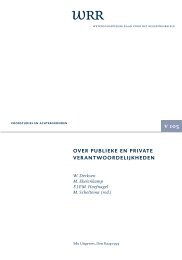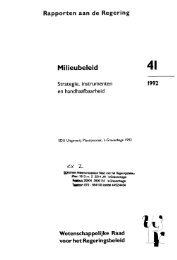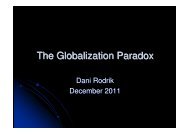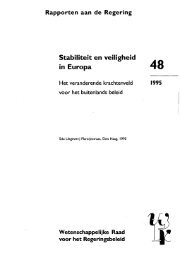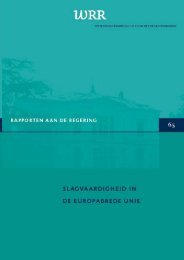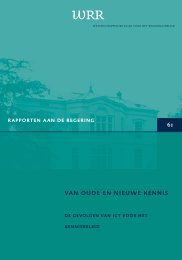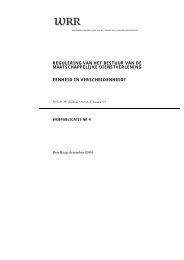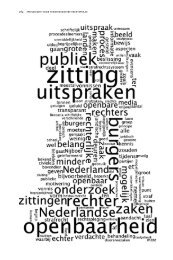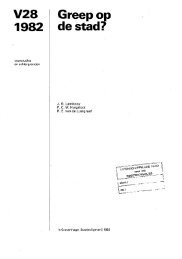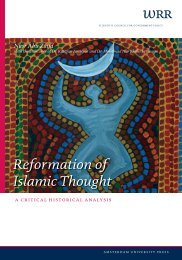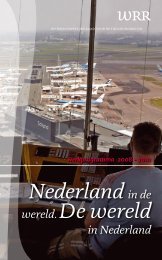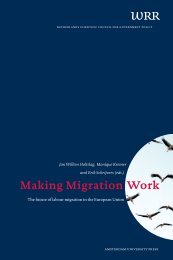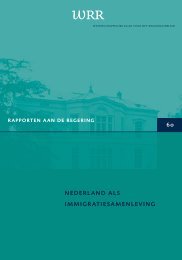- Page 1:
Op steenworp afstand 35 ja ar P a u
- Page 4 and 5:
De Wetenschappelijke Raad voor het
- Page 6 and 7:
Vormgeving en layout: Studio Danië
- Page 8 and 9:
5 De jaren tachtig en negentig: mon
- Page 11 and 12:
Woord vooraf De wrr is van 1972. Da
- Page 13:
wrr die gebruikt zijn in deel I. Ee
- Page 17 and 18:
1 Inleiding: Gewoon en bijzonder De
- Page 19 and 20:
dieper en laten zien tegen welke ac
- Page 21:
noten 1 Paul den Hoed is als senior
- Page 24 and 25:
op s t een wor p a f s ta n d 22 De
- Page 26 and 27:
op s t een wor p a f s ta n d 2 4 D
- Page 28 and 29:
op s t een wor p a f s ta n d 26 De
- Page 30 and 31:
op s t een wor p a f s ta n d 28 De
- Page 32 and 33:
op s t een wor p a f s ta n d 30 De
- Page 34 and 35:
op s t een wor p a f s ta n d 32 De
- Page 36 and 37:
op s t een wor p a f s ta n d 34 De
- Page 38 and 39:
op s t een wor p a f s ta n d 36 De
- Page 40 and 41:
op s t een wor p a f s ta n d 38 De
- Page 42 and 43:
op s t een wor p a f s ta n d 40 De
- Page 44 and 45:
op s t een wor p a f s ta n d 42 De
- Page 46 and 47:
op s t een wor p a f s ta n d 4 4 D
- Page 48 and 49:
op s t een wor p a f s ta n d 46 De
- Page 50 and 51:
op s t een wor p a f s ta n d 48 De
- Page 52 and 53:
op s t een wor p a f s ta n d 50 De
- Page 55 and 56:
3 Nieuwe adviescolleges in interbel
- Page 57 and 58:
staat en maatschappij niet zo vanze
- Page 59 and 60:
3.1.2 Het Grondwetsartikel en de pa
- Page 61 and 62:
Zo bezien is het niet opmerkelijk d
- Page 63 and 64:
De Bevredigingscommissie slaagde er
- Page 65 and 66:
Onderwijsraad gehoord’, hetgeen i
- Page 67 and 68:
ten anders dan de werkliedenverenig
- Page 69 and 70:
nhm) mr. E. Heldring (lid van de ra
- Page 71 and 72:
De Economische raad had een open ta
- Page 73 and 74:
sociaal-economisch gebied. Leden we
- Page 75 and 76:
Ingenieurs, ondernemers, ambtenaren
- Page 77 and 78:
3.2 de verzuiling tijdens de wedero
- Page 79 and 80:
inkomen dat daaruit afkomstig was.
- Page 81 and 82:
lijke organisaties (en zo op de ser
- Page 83 and 84:
Eenheids Vak Centrale (evc). De cen
- Page 85 and 86:
pbo en ser De Wet op de bedrijfsorg
- Page 87 and 88:
streep niet; op verzoek van de indi
- Page 89 and 90:
(1954), die een zekere gelijkenis h
- Page 91 and 92:
noten 1 Het extraparlementaire kabi
- Page 93:
35 ja ar wrr 1
- Page 96 and 97:
op s t een wor p a f s ta n d 4 Dee
- Page 98 and 99:
op s t een wor p a f s ta n d 6 Dee
- Page 100 and 101:
op s t een wor p a f s ta n d 8 Dee
- Page 102 and 103:
op s t een wor p a f s ta n d 100 D
- Page 104 and 105:
op s t een wor p a f s ta n d 102 D
- Page 106 and 107:
op s t een wor p a f s ta n d 104 D
- Page 108 and 109:
op s t een wor p a f s ta n d 106 D
- Page 110 and 111:
op s t een wor p a f s ta n d 108 D
- Page 112 and 113:
op s t een wor p a f s ta n d 110 D
- Page 114 and 115:
op s t een wor p a f s ta n d 112 D
- Page 116 and 117:
op s t een wor p a f s ta n d 114 D
- Page 118 and 119:
op s t een wor p a f s ta n d 116 D
- Page 121 and 122:
5 De jaren tachtig en negentig: Mon
- Page 123 and 124:
maatschappelijke partijen en daarto
- Page 125 and 126:
De derde verandering betreft de age
- Page 127 and 128:
Vooral ook de introductie van de pe
- Page 129 and 130:
plaatsen kunnen die efficiënter we
- Page 131 and 132:
eeld geleverd door de Stichting van
- Page 133 and 134:
Enkele krantenkoppen over de WRR en
- Page 135 and 136:
ven (technolease steun aan Philips
- Page 137 and 138:
het functioneren en de organisatie
- Page 139 and 140:
aan louter zijn samengesteld uit de
- Page 141 and 142:
ijksbreed een populaire benadering.
- Page 143 and 144:
NOTEN 1 De ser omdat hij deel uitma
- Page 145:
51 tk 1995-1996, 24 503, nrs. 1-3.
- Page 148 and 149:
op s t een wor p a f s ta n d 146 D
- Page 150 and 151:
op s t een wor p a f s ta n d 148 D
- Page 152 and 153:
op s t een wor p a f s ta n d 150 D
- Page 154 and 155:
op s t een wor p a f s ta n d 152 D
- Page 156 and 157:
op s t een wor p a f s ta n d 154 D
- Page 158 and 159:
op s t een wor p a f s ta n d 156 D
- Page 160 and 161:
op s t een wor p a f s ta n d 158 D
- Page 162 and 163:
op s t een wor p a f s ta n d 160 D
- Page 164 and 165:
op s t een wor p a f s ta n d 162 D
- Page 166 and 167:
op s t een wor p a f s ta n d 164 D
- Page 168 and 169:
op s t een wor p a f s ta n d 166 D
- Page 170 and 171:
op s t een wor p a f s ta n d 168 D
- Page 172 and 173:
op s t een wor p a f s ta n d 170 D
- Page 174 and 175:
op s t een wor p a f s ta n d 172 D
- Page 176 and 177:
op s t een wor p a f s ta n d 174 D
- Page 179 and 180:
De wrr in actie 7 Het Instellingsbe
- Page 181 and 182:
studies en achtergronden’. Ze zij
- Page 183 and 184:
De wrr en de coba Deze theoretische
- Page 185 and 186:
menten rakende, beleidsterrein. Een
- Page 187 and 188:
Minister-president Den Uyl heeft ni
- Page 189 and 190:
ehandelen, en zo materiaal leveren
- Page 191 and 192:
kritische evaluatie over de raad ge
- Page 193 and 194:
andere boodschap over een groot maa
- Page 195 and 196:
geschoeid dan de atv: ze zou werken
- Page 197 and 198:
1987), met daarnaast tal van andere
- Page 199 and 200:
Lobbygroepen komen een vak aanbiede
- Page 201 and 202:
gelegd op arbeidsparticipatie als w
- Page 203 and 204:
met vele kamers. Er waren rapporten
- Page 205 and 206:
De verbreding van de omgeving waart
- Page 207 and 208:
Figuur 2 Aantal rapporten aan de re
- Page 209 and 210:
debatten over de werkloosheid en de
- Page 211 and 212:
Die kwetsbaarheid van de positie va
- Page 213 and 214:
hij als secretaris-generaal van Alg
- Page 215 and 216:
Lange Vijverberg 4-5, de huidige lo
- Page 217 and 218:
21 P.A. van der Duin (red.) (2004)
- Page 219:
35 ja ar wrr 217
- Page 222 and 223:
op s t een wor p a f s ta n d 220 D
- Page 224 and 225:
op s t een wor p a f s ta n d 222 D
- Page 226 and 227:
op s t een wor p a f s ta n d 22 4
- Page 228 and 229:
op s t een wor p a f s ta n d 226 L
- Page 230 and 231:
op s t een wor p a f s ta n d 228 L
- Page 232 and 233:
op s t een wor p a f s ta n d 230 L
- Page 234 and 235:
op s t een wor p a f s ta n d 232 L
- Page 236 and 237:
op s t een wor p a f s ta n d 234 L
- Page 239:
D E E L I I E VENWICHT SK UNSTENA A
- Page 242 and 243:
op s t een wor p a f s ta n d 2 40
- Page 244 and 245:
op s t een wor p a f s ta n d 2 42
- Page 246 and 247:
op s t een wor p a f s ta n d 2 4 4
- Page 248 and 249:
op s t een wor p a f s ta n d 2 46
- Page 250 and 251:
op s t een wor p a f s ta n d 2 48
- Page 252 and 253:
op s t een wor p a f s ta n d 250 D
- Page 255 and 256:
2 Het Verenigd Koninkrijk: van cprs
- Page 257 and 258:
to be reinforced by a clear and com
- Page 259 and 260:
ambtenaar ten deel kwam, kwam voort
- Page 261 and 262:
“The Prime Minister has reviewed
- Page 263 and 264:
egering te ondersteunen. De su past
- Page 265 and 266:
van de Strategic Audits. Onderwerpe
- Page 267:
eenkomende analyse kreeg ook de cpr
- Page 270 and 271:
op s t een wor p a f s ta n d 268 D
- Page 272 and 273:
op s t een wor p a f s ta n d 270 D
- Page 274 and 275:
op s t een wor p a f s ta n d 272 D
- Page 276 and 277:
op s t een wor p a f s ta n d 274 D
- Page 279 and 280:
4 Frankrijk: van Commissariat du Pl
- Page 281 and 282:
Zoals besproken in hoofdstuk 1 zijn
- Page 283 and 284:
tificeren van punten waarop overeen
- Page 285 and 286:
Na de verkiezingen, verloren door J
- Page 287 and 288:
de regel ter hand nemen. Boissard z
- Page 289 and 290:
commissie die in staat is over alle
- Page 291:
Tot slot Het Commissariat Général
- Page 294 and 295:
op s t een wor p a f s ta n d 2 2 D
- Page 296 and 297:
op s t een wor p a f s ta n d 2 4 D
- Page 298 and 299:
op s t een wor p a f s ta n d 2 6 D
- Page 300 and 301:
op s t een wor p a f s ta n d 2 8 D
- Page 303 and 304:
Conclusies 6 In de voorgaande hoofd
- Page 305 and 306:
met andere vormen van kennis aangaa
- Page 307 and 308:
het Centre d’Analyse Stratégique
- Page 309 and 310:
een aantal stappen de afstand tot b
- Page 311 and 312:
In 1989 is bij de Europese Commissi
- Page 313 and 314:
noten 1 Anne-Greet Keizer is als we
- Page 315 and 316:
liter atuur Abelson, D.E. (2002) Do
- Page 317:
Müller-Rommel, F. en G. Pieper (19
- Page 321 and 322: 1 Introductie: denken en leren als
- Page 323 and 324: vormden vanaf de jaren zestig het c
- Page 325: De 7 de raad gefotografeerd in 2005
- Page 328 and 329: op steenworp afstand 326 Deel III -
- Page 330 and 331: op steenworp afstand 328 Deel III -
- Page 333 and 334: 3 De politiek als een weerbarstige
- Page 335 and 336: municatie. Beroemd is in dat verban
- Page 337 and 338: Ondanks de aanwezigheid van velerle
- Page 339 and 340: langrijke mate te maken met de cons
- Page 341 and 342: Er bestaan zelden heldere standaard
- Page 343 and 344: Maar een van de grootste problemen
- Page 345: we voorheen besproken hebben laten
- Page 348 and 349: op steenworp afstand 346 Deel III -
- Page 350 and 351: op steenworp afstand 348 Deel III -
- Page 352 and 353: op steenworp afstand 350 Deel III -
- Page 354 and 355: op steenworp afstand 352 Deel III -
- Page 356 and 357: op steenworp afstand 354 Deel III -
- Page 359 and 360: 5 Contexten, niveaus en dynamiek va
- Page 361 and 362: is aantoonbaar dat dat soms wel deg
- Page 363 and 364: empirie van beleid en politiek is h
- Page 365 and 366: arbeidsongeschikten. Een acuut gevo
- Page 367 and 368: We komen nu tot een geaggregeerde e
- Page 369: 3 Paradigmatisch leren Paradigmatis
- Page 374 and 375: op steenworp afstand 372 Deel III -
- Page 376 and 377: op steenworp afstand 374 Deel III -
- Page 378 and 379: op steenworp afstand 376 Deel III -
- Page 380 and 381: op steenworp afstand 378 Deel III -
- Page 382 and 383: op steenworp afstand 380 Literatuur
- Page 384 and 385: op steenworp afstand 382 Literatuur
- Page 386 and 387: op steenworp afstand 384 Literatuur
- Page 389 and 390: B i j l a g e i Publicaties van de
- Page 391 and 392: 42 Grond voor keuzen. Vier perspect
- Page 393 and 394: VOORSTUDIES EN ACHTERGRONDEN Eerste
- Page 395 and 396: V35 H.F. Munneke et al. (1983) Orga
- Page 397 and 398: V56 C. de Klein en J. Collaris (198
- Page 399 and 400: V88 L. Hagendoorn et al. (1995) Etn
- Page 401 and 402: VERKENNINGEN Zevende raadsperiode (
- Page 403 and 404: WP 18 H. Prast (2007) The psycholog
- Page 405 and 406: W17 The Unfinished European Integra
- Page 407 and 408: W56 T. Elfring, W. van der Aa en R.
- Page 409 and 410: W90 A. Brouwers, M. Kwast-van Duurs
- Page 411: wrr 35 ja ar 40
- Page 414 and 415: op s t een wor p a f s ta n d 412 B
- Page 416: op s t een wor p a f s ta n d 414 B
- Page 421 and 422: Verantwoording In 1972 werd de Wete
- Page 423 and 424:
Inleiding Op de brug tussen wetensc
- Page 425 and 426:
Het eenvoudigst is het natuurlijk a
- Page 427:
De verscheidenheid in de wetenschap
- Page 430 and 431:
428 op de brug t us sen w e t ensch
- Page 432 and 433:
430 op de brug t us sen w e t ensch
- Page 434 and 435:
432 op de brug t us sen w e t ensch
- Page 437 and 438:
“Als je geen missie hebt, moet je
- Page 439 and 440:
Van der Zwan merkte dat Den Uyl wel
- Page 441:
ood de wrr een ideale mogelijkheid
- Page 444 and 445:
4 42 op de brug t us sen w e t ensc
- Page 446 and 447:
4 4 4 op de brug t us sen w e t ens
- Page 448 and 449:
4 46 op de brug t us sen w e t ensc
- Page 451 and 452:
“Ik zag de rapporten niet primair
- Page 453 and 454:
zitter van vno-ncw als voor een min
- Page 455:
van het minimumloon. Het rapport Al
- Page 458 and 459:
456 op de brug t us sen w e t ensch
- Page 460 and 461:
458 op de brug t us sen w e t ensch
- Page 462 and 463:
460 op de brug t us sen w e t ensch
- Page 465 and 466:
“Bestuurders moet je niet lastig
- Page 467 and 468:
Toen Marina van Damme in 1988 in de
- Page 469:
kwam geen enkele reactie. Alsof hij
- Page 472 and 473:
470 op de brug t us sen w e t ensch
- Page 474 and 475:
472 op de brug t us sen w e t ensch
- Page 476 and 477:
474 op de brug t us sen w e t ensch
- Page 479 and 480:
“Niet te veel aantrekken van de g
- Page 481 and 482:
We hebben gekeken naar wat volgens
- Page 483:
In zijn korte loopbaan als fractiev
- Page 486 and 487:
484 op de brug t us sen w e t ensch
- Page 488 and 489:
486 op de brug t us sen w e t ensch
- Page 491 and 492:
“De wrr moet boven alles respect
- Page 493 and 494:
naal van acht uur. Het ging allemaa
- Page 495 and 496:
tijdje ontdekken dat je het over de
- Page 497:
verdedigd: bij het bewindsliedenove
- Page 500 and 501:
4 8 op de brug t us sen w e t ensch
- Page 502 and 503:
500 op de brug t us sen w e t ensch
- Page 505 and 506:
“Besprekingen met de wrr behoorde
- Page 507 and 508:
terraad voerde met de wrr over het
- Page 509:
Aartsen was daar destijds erg gecha
- Page 512 and 513:
510 op de brug t us sen w e t ensch
- Page 514 and 515:
512 op de brug t us sen w e t ensch
- Page 516 and 517:
514 op de brug t us sen w e t ensch
- Page 520:
Op steenworp afstand Paul den Hoed



